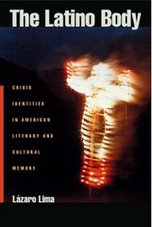 (left: Red from "Red Dead Revolver" video game, Rockstar Productions, 2006)
(left: Red from "Red Dead Revolver" video game, Rockstar Productions, 2006)Reperire pax, “find peace,” is certainly a noble enough call to justice and the raison d’être of Red, the protagonist of the videogame Red Dead Revolver. But Red—pictured with this imperative call literally crowning one of his revolvers—attempts to find it through the pursuit and annihilation of Mexican General Diego and those of similar ilk who killed his family when he was a boy. Armed with his father’s revolver as a literal and metonymic emblem of forced penetrations, Red’s quest partakes of a cultural repertoire of images that have infused the American popular imagination with murderous Mexicans from the nineteenth century to the present.
But playing American in this context is about being played. From the serial western novel, to the Lone Ranger radio show of the 1940s and, later, the television show of the 1950s, and its heirs in the Hollywood and spaghetti westerns, all the way to Walker, Texas Ranger, "Red Dead Revolver" continues an investment in American national identity through a folk mythology that is neither historically factual nor ethically accountable. As an exemplar of the processes by which American cultural memory and amnesia find public expression, Red evinces the continued investment in an American national fantasy that requires continuous interrogation, resistance, and illumination. Reperire pax, indeed.

